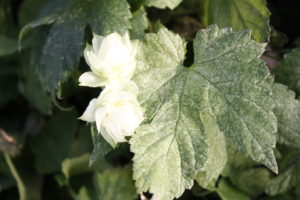American-grown hops continue to be desired by brewers around the world. According to Hop Growers of America, the United States is the largest producer of hops in the world, contributing 40 percent of the global hop supply.
As the craft beer industry and demand for American-grown aroma hops continues to expand on an international scale, domestic growers have a key pest standing in the way of exporting hops: the two-spotted spider mite.
Thanks to IR-4 sponsored efficacy, residue, and crop safety trials, as well as coordination among the hop industry, growers now have a tool to combat this pest and ensure a healthy crop for brewers around the world.
Researching a Potential Solution
According to Washington State University Entomologist and IR-4 State Liaison Doug Walsh, spider mites feed on leaves and cones of the hop bine, resulting in discoloration and defoliation in areas of extreme spider mite population, as well as brittle cones that reduce quality and quantity of the crop yield.

In an effort to find a solution to this problem, Walsh conducted an extensive efficacy and crop safety study in 2017 using the miticide cyflumetofen, which is sold in the U.S. by BASF as Nealta Miticide.
Walsh brought his results to the U.S. Hop Industry Plant Protection Committee, a joint committee of Hop Growers of America and the Washington, Oregon, and Idaho hop commissions that coordinates plant protection activities across most organizations involved in the hop industry.
Using Walsh’s data, the committee submitted a request to IR-4 for cyflumetofen to be studied for a potential label expansion to include two-spotted spider mites on hops. The request was subsequently approved for research at the 2017 Food Use Workshop.
For Dan Heider, senior outreach specialist with the integrated pest management program at the University of Wisconsin, the timing was perfect.
“Most often with hops it’s the Pacific Northwest hop growers who are really the drivers,” said Heider. “Once the U.S. Hop Industry Plant Protection Committee made the initial request to IR-4 about cyflumetofen, we knew that Wisconsin hop growers could use it quite effectively as well.”
Starting in 2018, Heider, Walsh, and other researchers conducted IR-4 sponsored trials of cyflumetofen on multiple hop varieties in Idaho, Oregon, Washington, and Wisconsin.
“We expected cyflumetofen to provide adequate control of two-spotted spider mite. It was crop safety that was in question,” said Heider. “There were no crop injury issues, which matched the study results of other locations, including the Pacific Northwest.”
IR-4 submitted data generated from these trials to the U.S. Environmental Protection Agency in July 2020 for the approval of cyflumetofen on hops. EPA approved the use in December of 2021, and BASF released a product label for Nealta into the marketplace for use in 2022.
Benefits of Cyflumetofen
In addition to effectively managing two-spotted spider mite, cyflumetofen has been shown to be safe on beneficials that control mite populations, including predatory mites and seven-spotted lady beetles.
Another benefit of cyflumetofen is its mode of action, which is different from other miticides that already show substantial levels of resistance in mite populations. Bringing in a new technology such as cyflumetofen and putting it into rotation with other tools will help to reduce the chances of pests developing resistance.
Finally, cyflumetofen is effective on all mite stages, including eggs, nymphs and adults.
About the IR-4 Project
The mission of the IR-4 Project is to facilitate regulatory approval of sustainable pest management technologies for specialty crops and specialty uses to promote public well-being. By working directly with local crop growers across the country, IR-4 conducts research and develops data necessary for the registration of pest management tools, ensuring that they are safe for use. To learn more, visit our website.
